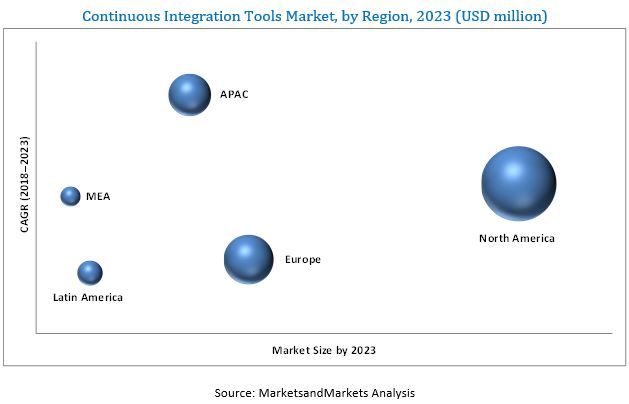The Continuous integration tools market is expected to grow from USD 483.7 million in 2018 to USD 1,139.3 million by 2023, at a Compound Annual Growth Rate (CAGR) of 18.7% during the forecast period. The major growth driver for the market is the increasing demand for automation of software development process to quickly release software application. Continuous integration tools are becoming crucial in the application development process, as they can considerably reduce the time required to create a build, and improve developer productivity, and thereby accelerate the time-to-market.
Know More@ https://www.marketsandmarkets.com/Market-Reports/continuous-integration-tools-market-154327001.html
The scope of this study covers the continuous integration tools market analysis by deployment mode, organization size, vertical, and region. Based on deployment mode, the market is segmented into on-premises and the cloud. The on-premises deployment mode gives organizations complete control over all their systems and data. However, most of the large enterprises prefer continuous integration tools deployed on-premises due to advanced security features. Cloud-based deployment, on the other hand, benefits organizations with increased scalability, speed, 24/7 service, and enhanced IT security. The demand for cloud based continuous integration tools are expected to be rapidly increasing, as it serves as a dominant Integration tools model in meeting the IT security needs.
Based on organization size, the continuous integration tools market is segmented into SMEs and large enterprises. The adoption rate of continuous integration suite among large enterprises is expected to be relatively high as compared to that among the SMEs. Due to the huge IT infrastructure budgets and high demand for advanced technologies, the large enterprises segment is expected to hold a larger market size in the market. The market in terms of organization size is important, as it has a direct impact on the adoption of DevOps tools and services worldwide.
The continuous integration tools are adopted across verticals, such as BFSI; media and entertainment; retail and ecommerce; healthcare; manufacturing; telecommunication; education; and others (government, energy and utilities, and logistics and transportation). The media and entertainment vertical is expected to hold the largest market size, as they have started adopting continuous integration tools for applications and software to meet the growing demand for automation and testing to unify the entire development process into an end-to-end process. CI/ CD tools are gaining traction across verticals to enhance the customer experience and the overall productivity of companies.

As per the geographic analysis, North America is expected to have the largest market size in the global continuous integration tools market, while APAC is expected to grow at the highest CAGR during the forecast period. The North American region has witnessed increased investments in the market. A considerable growth is expected in the region during the forecast period. In this region, the growing demand automating the build process to enhance the developer productivity are becoming crucial and achieve competitive advantage.
A major restraining factor for the growth of the continuous integration tools market could be the availability of open source tools. Existing integration methods and lack of expertise in assembling and setting up of continuous integration system would the major challenges in the adoption of continuous integration tools.
The major vendors covered in the continuous integration tools market include Atlassian (Australia), IBM (US), Microsoft (US), Micro Focus (UK), CA Technologies (US), Cloudbees (US), AWS (US), Puppet (Oregon), Red Hat (US), CA Technologies (US), Oracle (US), Micro Focus (UK), SmartBear (US), Jetbrains (Czech Republic), CircleCI (US), Shippable (US), Electric Cloud (US), V-Soft Technologies (South Africa), BuildKite (Australia), TravisCI (Germany), AutoRABIT (US), AppVeyor (Canada), Drone.io (US), Rendered Text (Serbia), Bitrise (Hungary), Nevercode (UK), and PHPCI (Belgium). These vendors have adopted various organic and inorganic growth strategies, such as new product launches, partnerships and collaborations, and mergers and acquisitions, to expand their presence in the global market.
To speak to our analyst for a discussion on the above findings, click Speak to Analyst
No comments:
Post a Comment